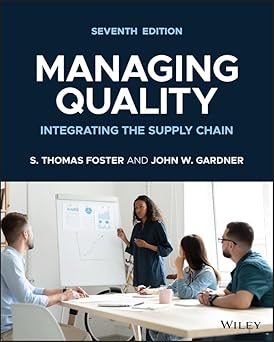Managing Quality: Integrating the Supply Chain, 7th Edition
by S. Thomas Foster, John W. Gardner
Key Highlights
- •Comprehensive coverage linking Quality Management and Supply Chain Integration.
- •Features practical tools, techniques (like SPC, Six Sigma), and real-world applications.
- •Updated 7th Edition reflecting current business practices and challenges.
Description
Ready to master the art of quality in today's complex business world? Dive into Managing Quality: Integrating the Supply Chain, 7th Edition! This essential guide provide a comprehensive look at how quality management principles are woven into every aspect of the modern supply chain. Whether you're navigating global logistics or looking to improve internal processes, this book is your go-to resource for quality managment and supply chain optimization.
Who is this book for? It's designed for business students (both undergrad and graduate level), aspiring and current quality managers, operations professionals, supply chain specialists, and engineers focused on quality control. Basically, anyone whose job involves making things better, faster, and more reliable within a business context will find immense value here.
What problem does this book solve? In a world where supply chains are stretched thin and customer expectations are higher than ever, maintaining consistent quality is a huge challenge. This book tackle that head-on. It helps you understand how to break down silos between departments and integrate quality thinking from raw materials sourcing all the way to the final customer. It addresses the pain point of managing quality across diverse suppliers and complex logistical networks.
What will you gain from reading it? You'll get practical knowledge and actionable strategies for implementing robust quality management systems. Learn about essential tools, statistical process control, Six Sigma, Lean principles, and how they apply throughout the supply chain. This book help you develop the skills to identify bottlenecks, reduce defects, improve efficiency, and ultimately boost customer satisfaction and your company's bottom line. The 7th edition ensures you're getting up-to-date insights relevant to today’s business environment.
Why is it worth reading? Because quality isnt just a department, it's a philosophy that needs to permeate the entire supply chain. This book offers a unique, integrated perspective that many others lack. It's a well-established text, now in its 7th edition, reflecting its trusted status and relevance in both academic settings and the professional world. It offers a solid foundation and advanced concepts, making it a valuable reference you'll return to again and again. Don't miss out on leveling up your quality and supply chain skills - grab your PDF copy today!
FAQ
Is this book good for someone completely new to quality management?
While it's comprehensive, it's often used as a textbook, so it starts with fundamentals. Beginners might find it challenging but very rewarding, especially if used alongside a course or with some prior business knowledge. It really builds a strong foundation.
Does this book cover specific quality standards like ISO 9001 or Six Sigma in detail?
Yes, the book covers key quality philosophies and standards. It delves into concepts like Six Sigma, Lean principles, and the thinking behind standards like ISO 9000, explaining how they fit into the broader quality management framework within the supply chain.
Is this book more theoretical or practical?
It strikes a good balance. It covers the essential theories and principles of quality management but also focuses heavily on practical application, tools, and how to integrate these concepts within a real-world supply chain context. There are practical examples troughout.
How relevant is this 7th edition compared to previous ones?
The 7th edition is updated to reflect current trends, technologies, and challenges in global supply chains and quality management. It likely includes newer case studies, updated data, and possibly refined explanations of core concepts, making it more relevant for today's students and professionals.
Does the book focus only on manufacturing quality?
No, while manufacturing is a key area, the principles discussed apply broadly to service industries as well. The integration of the supply chain inherently involves service aspects like logistics, customer service, and supplier relations.
What kind of tools or techniques are discussed?
You can expect coverage of tools like Statistical Process Control (SPC), process mapping, quality function deployment (QFD), failure modes and effects analysis (FMEA), as well as methodologies like Six Sigma and Lean management.
Reader Reviews
About the Author
S. Thomas Foster is a noted authority and professor specializing in operations and supply chain management. With extensive research and teaching experience, his work focuses on quality management, process improvement, and global supply chain strategy, making him a respected voice in both academic and industry circles.
